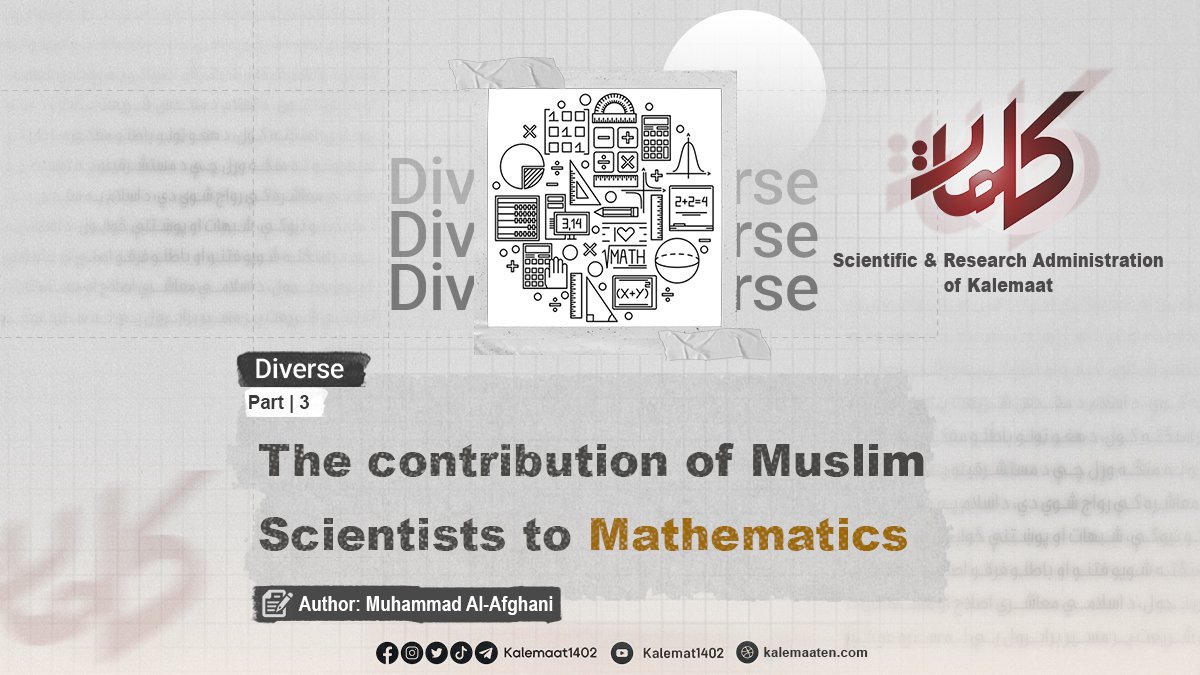
Author: Muhammad Al-Afghani
The Contribution of Muslim Scientists in Mathematics (Part Three)
Enduring Figures in Mathematics
In this section, we will get to know another prominent figure in mathematics; a scientist who made a great contribution to the advancement of natural sciences with his enduring works, especially in mathematics.
Abu Rayhan al-Biruni
Introduction of his Personality
Abu Rayhan al-Biruni is a name taken from a small village called Birun, where he was born. He spent his childhood in Kharazm and then traveled to Ghazni with Sultan Mahmud Ghaznavi then to India. Al-Biruni died in Ghazni during the reign of Sultan Masoud, the son of Sultan Mahmud.
In scientific circles around the world, from East to West, he is known as the Ustad Javid (Immortal Professor). Al-Biruni sought to achieve scientific positions with great love and interest from his childhood and appeared diligent and hardworking in this path. He never stopped trying to achieve his scientific goals and preferred the path of knowledge even to moments of comfort and prosperity.
The court of kings was always open to al-Biruni, but instead of royal caress, he always chose the path of knowledge. In the field of natural sciences, his efforts led to many achievements.
His functions
Al-Biruni was fluent in Greek, Hindi and Arabic and greatly benefited from these linguistic abilities in his scientific path. He paved the way for himself to study and gain knowledge by his deep knowledge of different languages.
Al-Biruni’s works
In historical books, more than 146 works by Abu Rayhan al-Biruni have been reported, with a total of more than 13,000 lines. Some of his most important works include:
1. Al-Tanjim: in the fields of mathematics and astronomy;
2. Athar al-Baqiyyah: which deals with history and geography;
3. Qanun al-Masudi: an encyclopedia in which various topics including astronomy and calendar have been examined in detail;
4. Tahqiq Malelhind: A book that examines the conditions of the land of India, including its history, geography, customs, traditions, and social classes. Al-Biruni named the book “Qanun Mas’udi” after Sultan Mas’ud of Ghaznavi, who, in response to the Sultan’s gift – three camels full of silver coins – declared that he had written the book to serve knowledge and its spread, not to acquire wealth.
Al-Biruni was a contemporary of Abu Ali Sina, and the two corresponded and exchanged ideas. During the campaigns of Sultan Mahmud to India, Al-Biruni had the opportunity to learn the Indian language and research about this land, the result of which is his book “Indology”. Among his other works, we can mention the book “Al-Saydena fi al-Tibb”, which deals with the subject of medicinal plants and was corrected and published by Dr. Abbas Zaryab Khoi. Below, we will examine some of Al-Biruni’s prominent works in a list:
Tahqiq Malelhind: This book deals in detail with the customs and traditions of the Hindus and an account of Al-Biruni’s trip to India.
Qanun al-Masudi: It consists of eleven parts and deals with topics such as astronomy, calendar, spherical trigonometry, dimensions of the Earth, Sun, Moon and planets.
Al-Tafheem La’a’il Sana’at Al-Tanjim: A Persian-language book on astronomy that has been used as a textbook for teaching mathematics and astronomy for centuries.
Al-Jamahir fi Ma’refat al-Jawahir: Al-Biruni introduces various minerals and gems and reviews the opinions of scientists such as Aristotle and Ishaq al-Kindi about three hundred types of minerals. The book contains detailed descriptions of the physical properties of minerals.
Al-Saydena fi al-Tibb: This book is about medicinal plants, their properties and how to prepare them.
Al-Tahrir al-Baqiyyah ‘an al-Qoroun al-Khaliya (The Remaining Works of the Past Centuries): Abu Rayhan discusses the origins of dates and chronology of various peoples in this book.
Istiab al-Wujuh al-Mumkena fi Sana’at al-Astrolabe: This book is about the different methods of making an astrolabe.
Al-Biruni was fluent in Hindi and Sanskrit and translated various books from Hindi into Arabic, including: “Sayyid Hanta”, “Al-Mawaliyyah Al-Saghira”, “Kalb Yarah” and also translated stories from Persian into Arabic, including “Shad Bahr (Hadith Qasim Al-Surur) Ayn Al-Hayat”, the story of “Urmazdiyar and Mehryar” and also the story of “Sorkh Bot and Kheng Bot (Hadith Sanami Al-Bamiyan)”.
Abu Rayhan Al-Biruni, who died in 440, studied more than any other Islamic scholar in Indian sciences and literature. He has dozens of works, some of which are translations, corrections or criticisms.
Continues…


